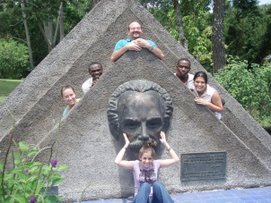After a decade of reflection, and six months of mental struggle to bring it into shape, the topic of my thesis now finds itself VIOLENTLY thrust into the spotlight, just as the spotlight fickers and dies, leaving us in a pitch-black scramble to rearrange our lives and ponder "who's to blame?"
I've been hearing words of doom about the imminent (though hopefully temporary) collapse of Costa Rica's power grid for at least the past 3 years. However, I hadn't imagined that, when it came, it would happen as unceremoniously.
According to today's La Nacion, 5 different pieces of equipment in 4 different powerplants failed within a two week period, coinciding with low reservoir levels due to the dry season. The low rainfall affected not only Costa Rica, but also Panama, leading it to cut power exports to Costa Rica a month ago. However, this serves little as an explanation, and more as a mere mechanic's checklist of pieces that gave in under the stress of a tragically flawed institutional reality.
As for me, I trace the origins of the crisis to a number of bridges (metaphorical ones) that people chose to burn along the way as they pulled in different directions while trying to carve the future shape of Costa Rican development.
Some of these bridges were burned before 2000, by the "elephant in the china shop" approach of some hydro developers who felt that, by simply pulling strings in San Jose, they could trample over people's sense of connection to their land, to their communities, and their pragmatic notions about fairness, which plainly required that exploiting local resource should be tied to promoting local prosperity. Many more bridges were burned through the fire of the ICE Combo protests, that gave civil society a sense of purpose, but also offered instant political capital to self-styled crisis entrepreneurs. The greatest irony was that ICE, the very symbol that people went to the streets to defend, found the hard way that it was no longer immune to the Pandora's box of social mobilization, as one after another, its projects also became the object of public outcry.
The problem, however, was not in the questioning, but in the fact that through all that bridge burning, we lost the capacity to listen to one another. And as the listening was lost, so were the spaces where we could come together and agree on what were the important questions that needed asking.
Many calls were raised to participation, but no one stepped up to participate in finding solutions. Others argued that private electricity was a swindle, because the rates were much higher than ICE's internal costs of generating that same energy, however, these were not there to analyze, in the absense of actions to either reduce consumption or find alternative sources, what the cost to consumers would be of either importing electricity or paying for the cost of diesel PLUS the fees to private companies for the emergency use of their diesel generators. To top it all off, the current administration annonced to the world last year its commmitment to turn Costa Rica, by the end of the next decade, into the first country ever to generate 100% of its electricity without fossil fuels, in an impressive display of obliviousness about its own inability to gain support from rural communities to build any more hydro projects, its main source of non-fossil power.
In summary, much of what we're facing in this blackout season is a result of what the 2004 State of the Nation Report referred to as Costa Rica's greatest challenge: its generalized incapacity to reach agreements across society about anything, and particularly about the path it needs to follow to construct its future. The landscape is now complicated by a new threat, the one of resorting to quick fixes when a situation becomes highly politically volatile. As the local saying goes, "stirred-up river, fisherman's gain". In Honduras, after the 1994 blackouts, those fishermen who took home the winfall were the thermal generators, as the country sealed its fate by signing large concessions that brought it, over less than a decade, from a primarily renewable (hydro) fuel mix to a "carb-saturated diet".
Now, more than ever, and sadly under great pressures, Costa Rica needs to make the right decision about the governance of its energy development. The quality of this decision, however, cannot stem from a bottomline/GDP analysis alone (and I'm sure we're going to hear a lot about energy and GDP in the coming days), rather it will depend on how well we take stock of all of the values, as well as the variables, that are at stake.
Through my thesis, Rediscovering democracy: Deliberating environmental insecurities in the Costa Rican power sector, I've set out to explore the potential offered by deliberative democracy, its ability to guide the inclusion of multiple values, and to help us strive to hear each others' concerns openly. Its goal is to help shape a model of environmental governance, taking the example of the power sector, which can help us construct legitimacy, understanding, and the social will to tackle the roots of the problems and to recognize the constraints on our resources, rather than resorting to quick fixes.
A site for constructing peace, living creatively, learning to abide with the nagging questions and rediscovering wonder. ------------------------------------------------------------------ You can also view my academic research blog at the following link http://deliberativegreen.blogspot.com
Love of my life

Me & Jenny outside Bocadito del Cielo near Turrialba
Links / Vínculos
- Ligmincha Institute founded by Tenzin Wangyal Ringpoche, my root Lama.
- Bön Sangha in Mexico, Garuda Asociacion Cultural Tibetana
- Restorative Justice in Brazil (Project my friend Dominic Barter helped launch)
- Website of my brilliant friend Rory's CREATIVITY HUB
- My genious dancer/political campaigner friend Sasha
- The Center for Nonviolent Communication
- Bay Area NVC, a wonderful chapter of the Nonvionlent Communication Network
- The Peace Army of Costa Rica, a Rasur Foundation Project
- In honour of my favorite tormented genious, Philip K. Dick.
- A site with poetry from Jimmy Santiago Baca
- IMPACT Bay Area, Full force self defense and rape prevention
With Jose Marti

Playing around with fellow students in Marti's statue at UPEACE
Archivo del Blog
Acerca de mí
- deliberativegreen
- I am Professor of Humanities, Organizational Behavior and Business at the Universidad Latinoamericana de Ciencia y Tecnologia (ULACIT) in Costa Rica. My academic background combines Environmental Security (MA-2009, University for Peace), Natural Resources Organization Management (Cert-1992, University of MIchigan) and Mechanical Engineering (B.Eng-1990, Carleton University). I have worked for over 15 years in renewable energy and environmental justice, and 10 years in enviromental and community conflict resolution.
Train ride

Taking the San Jose urban train with my UPEACE colleague Robyn